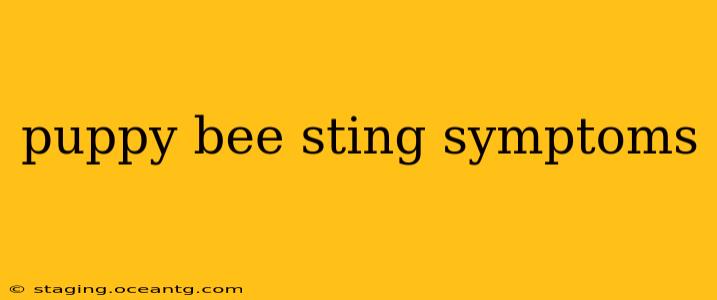Bee stings are a common summertime occurrence, but when your furry friend is the victim, it can be particularly alarming. Understanding the symptoms of a bee sting in puppies is crucial for prompt and appropriate treatment. This guide will help you identify the signs, know when to seek veterinary attention, and learn how to prevent future stings.
What are the Symptoms of a Bee Sting in a Puppy?
The symptoms of a bee sting in a puppy can vary depending on the location of the sting, the puppy's size, and their individual sensitivity to bee venom. However, some common signs you should watch for include:
- Localized Swelling and Pain: The most immediate symptom is usually swelling and redness around the sting site. Your puppy may show signs of discomfort, such as whining or licking the area excessively.
- Itching: Many puppies will experience intense itching at the sting site, leading to scratching and potential skin damage.
- Hives or Wheals: In some cases, you might observe hives or raised, itchy welts appearing elsewhere on your puppy's body, indicating a more widespread allergic reaction.
- Vomiting or Diarrhea: These gastrointestinal symptoms can occur as a result of the venom's effects or the puppy's stress response.
- Lethargy or Weakness: If your puppy seems unusually tired, weak, or uninterested in their surroundings, this could be a sign of a more serious reaction.
- Difficulty Breathing: This is a critical symptom that indicates a severe allergic reaction (anaphylaxis). Seek immediate veterinary care if you observe any signs of respiratory distress, such as rapid breathing, wheezing, or coughing.
- Excessive Drooling: This can be a sign of discomfort or a more serious reaction.
How Severe is a Bee Sting to a Puppy?
The severity of a bee sting in a puppy depends on several factors:
- Location of the Sting: A sting on the face, particularly near the mouth or throat, poses a greater risk of airway obstruction than a sting on the leg.
- Number of Stings: Multiple stings deliver a larger dose of venom, increasing the likelihood of a severe reaction.
- Puppy's Size: Smaller puppies are more vulnerable to the effects of bee venom due to their smaller size.
- Allergies: Some puppies have an allergic reaction to bee venom, which can range from mild to life-threatening.
My Puppy Got Stung by a Bee – What Should I Do?
First, remain calm. Your puppy will sense your anxiety.
- Remove the Stinger: If the stinger is still embedded in the skin, carefully scrape it away with a credit card or the edge of a blunt knife. Avoid squeezing the stinger, as this can release more venom.
- Clean the Area: Gently wash the sting site with mild soap and water.
- Apply a Cold Compress: A cold compress can help reduce swelling and pain.
- Monitor Your Puppy: Closely observe your puppy for any changes in behavior or appearance. Note the time of the sting and the symptoms you observe.
- Seek Veterinary Attention: If your puppy exhibits any signs of a severe allergic reaction (difficulty breathing, excessive drooling, lethargy, widespread hives), seek immediate veterinary care. Even if the symptoms are mild, contact your vet, especially if the sting is in a sensitive area or if your puppy shows any concerning symptoms.
How Can I Prevent Future Bee Stings?
Prevention is always the best approach. Here are some tips to minimize the risk of your puppy getting stung:
- Supervise your puppy closely, especially outdoors: Keep a watchful eye on your puppy, especially in areas known to have bees or other stinging insects.
- Avoid areas with known bee activity: Steer clear of flowering plants, garbage cans, and other places that attract bees.
- Teach your puppy to leave bees alone: Never encourage your puppy to chase or interact with bees.
What if my puppy is allergic to bee stings?
If your puppy has a known allergy to bee stings, your veterinarian may recommend carrying an epinephrine auto-injector (like an EpiPen for humans) and knowing how to administer it. This is crucial in the event of a severe allergic reaction. Regular veterinary checkups are essential for puppies with allergies.
Is it normal for a puppy to have a large reaction to a bee sting?
While some swelling and localized redness are expected, a large, widespread reaction or signs of systemic effects (like difficulty breathing) are not normal and warrant immediate veterinary attention. This could indicate an allergic reaction requiring prompt treatment.
This information is for general knowledge and should not replace professional veterinary advice. Always consult your veterinarian for any concerns about your puppy's health.
